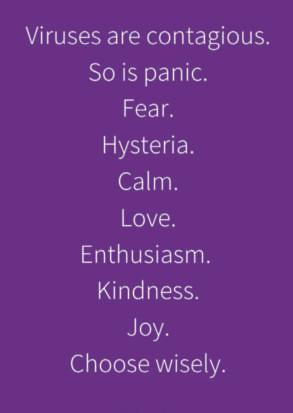
8 minute read
The Heart of the Matter: How the University High School College Counselors Are Navigating an Unusual Year
from UHS Journal 2020
by SFUHSorg
The Heart of the Matter:
How the University High School College Counselors Are Navigating an Unusual Year
— Jenny Schneider, Director of College Counseling & Kate Garrett, Associate Director of College Counseling
On Thursday, March 12, we grabbed armloads of student files, various college resource guides, and all manner of technological accoutrements. We hugged one another good-bye and headed to our respective homes for what we imagined would be a month or so of shelter-in-place.
In those early days of the pandemic, everything felt upside down, unfamiliar, fundamentally different. In reality, though, our day-to-day activities remained largely the same. The UHS Class of 2020 got into college, and they talked with us about which offer to accept. Some of them — although not the landslide number widely reported in the media — asked us about gap years. Others asked for guidance about their financial aid awards, and we coached them on how to negotiate a better package. By May 1, just like every year, everyone was settled, and then, as happens in many years, there was a little flurry of exciting activity as some students were accepted off of wait lists.
For their part, the Class of 2021 got to work building the first drafts of their college lists. We finished up the family meetings scheduled for the end of March via Zoom, frequently enjoying the participation of the entire family — including younger siblings practicing gymnastics in the background, cats jumping into students’ laps, or dogs barking their approval at some particularly sage bit of wisdom we offered (or maybe just at someone walking by a window). Realizing that students would be unable to explore any college campuses during spring break, our office put together a challenge we called “the virtual college tour.” Many students spent their spring break week in April visiting colleges online, diving deeply into institutions’ departmental websites, and chatting with UHS alums who were suddenly quarantined at home and eager to share about their college experiences. The juniors were exploring and learning the way they do every year, just using different methods.
And, just like every year, they were worrying about standardized testing. In the past, we’d have been talking through results from spring tests and sorting out whether further testing would be beneficial. In 2020, the conversation continues to be about whether the SAT and the ACT will ever go forward in the Bay Area, and how worried folks should be if state and county health guidelines prevent that from happening. The uncertainty has been trying for everyone, especially the students. As one of our colleagues described the situation, it’s like Charlie Brown and the football: the kids keep getting geared up to take the tests, only to have them snatched away at the last minute. We are trying as hard as we can to convey the genuine confidence we feel that our students will have a successful college process, no matter what does or does not happen with testing. Similar to conversations about the SAT and ACT in years past, kids and families listen, and nod, and try to stay calm . . . but still feel nervous.
March 17, 2020
UHS Head of School extends campus closure through the end of Spring Break (April 6-10).

With the passing weeks and months, one thing has become clear: while some of the circumstances, questions, and methodologies have changed, our work as college counselors at UHS has remained substantively the same. If anything, the principles that guide us and the ends we aim to achieve are even more relevant this fall. The medium has changed; the message is the same.
The work of the college counseling office is grounded in the mission, vision, and values of University High School. In particular, the part of our vision that commits us to “empowering students to invent and sustain their own vision of success and sense of purpose” remains the heart of the matter for us. The broader, often emphasized cultural conversation in the media about college admissions focuses obsessively on a tiny number of universities, trumpeting the alarmist message that this year is the toughest yet to get into these schools, year after year after year. This perpetual noise signals to teenagers that success only looks like a single outcome, and that achieving that outcome is almost impossible. As a result, our work is not just about shepherding students through an application process; it’s about helping them to navigate marketing and messaging that may have bombarded them for years and come to their own conclusions about what really matters to them.
Now more than ever, we see the many ways in which our job title — college counselor — is apt. We have our own vision of what it means to be a successful counselor, and we have articulated this vision in four statements, addressed to our students:
You have a deeper sense of what is important to you, what you care about, and who you are.
You expand your competency in important areas such as stress management, organization, resilience, and decision-making.
You remain healthy, balanced, and connected to the reality that “where you go is not who you’ll be.”
In the spring, each of you has made a choice about where you are going to college, and you are proud of the way you managed this process.
In some ways, the crises of the last few months have helped our students to understand what matters most. In the summer questionnaire we gave to the rising seniors, two of the questions we asked were: “What have you found most challenging about sheltering in place?” and “Have you experienced any unexpected benefits from the stay-at-home order?” Their answers to the first question included feeling isolated, missing friends, and some cabin fever. As for the unexpected benefits, along with many heartwarming comments about eating dinner with their families more often and playing board games with younger siblings, several students wrote about taking up drawing or creative writing, about having more time to reflect on the world and their place in it, and about feeling deeply grateful for their many blessings.
There have been challenges and benefits to the new normal for us, as well. We really miss seeing our students and colleagues in person, and we are tired of working in our dining rooms. But there have been some surprising upsides, too, from the whimsical to the quite profound. On the lighter side, one student was able to introduce her adorable new pair of kittens to her counselor, live on Zoom. Another held a meeting from a parked car while he waited to pick up his younger brother from a (socially distanced) playdate. On the more serious side, the inability to visit college campuses has led many students to engage in thoughtful, thorough research into schools that interest them. As a result, we feel that students’ knowledge base this year is at least as strong as, if not stronger than, in years past. While it may sound clichéd, we have been truly awed by the resilience, perspective, and flexibility of our students. And, of course, we have also noticed their stress, anxiety, and worries.
Which leads us to the challenges of our work this year.
We often share with families the work of Dr. Sonia Lupien, the director of the Center for Studies on Human Stress, who says that all stressful situations share some themes:
N — novelty; something new U — unpredictability; no way of knowing it could occur T — threat to the ego; feeling your competence is questioned S — sense of control; feeling you have little or no control in a situation
In other words, these situations are NUTS. And this certainly applies to the college process — something each student has never done before; something whose outcome cannot be predicted or controlled; and something that can leave a young person questioning their intelligence, their talent, and, sadly, even their self-worth. Now, “nuts” is a mild term to describe a global pandemic, but it is undeniable that today’s situation also features all four of these themes. There are even fewer things that we have control over now, and the consequences of the uncertainty feel even more threatening. But these strange circumstances call on us to employ similar coping strategies.
We believe that the best way to counter the inevitable stress caused by “nutty” situations is for individuals to draw on their core values. For example: C — care: being kind to ourselves and to one another and prioritizing well-being A — authenticity: staying true to ourselves and to what really matters to us L — levity: maintaining a sense of humor, especially about ourselves M— mindfulness: being selfaware and sensitive to others, and keeping things in perspective
An important part of our work, this year and every year, is to help each student create their own acronym, so to speak, composed of the skills, values, and habits of mind that help them thrive, not only during the college process but throughout their lives.
COVID-19 has led to one big change in the college office, however. We used to end our senior kick-off meeting with an extended metaphor about anxiety as a virus, complete with an image from the movie Contagion. Clearly, that had to go. This year, we ended with this slide, and we’ll leave you with the same message:

March 22, 2020
UHS Head of School announces that all alumni reunions (and all attendant gatherings May 1-2) are canceled, postpones Decorator Showcase until the fall.







